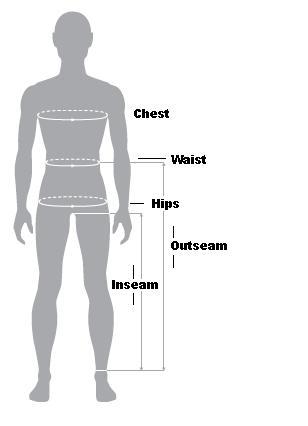combo_sizechart
Jersey Size Chart (Inches)

Pant Size Chart (Inches)

**The inseam length is the actual pant inseam
Your Measurement's

How to Measure
For the best results, have another person take measurements, while wearing light clothing. Tape measure should be snug, but not tight.- Chest - Measure under arms around fullest part of chest
- Waist - Measure around natural waist line
- Hip - Measure around fullest part of lower hip with feet together
- Inseam - Measure from crotch down inside of leg to floor (without shoes)
- Sleeve - Measure from center back of neck, across shoulder, down length ofarm to wrist bone
- Gloves/Mitts - Measure from wrist to top of middle finger
NOTE:
Our sizing charts and sizing information are provided by the manufacturers and in no way guarantees a perfect fit.
GLOVE SIZING INSTRUCTIONS
Using a cloth tape, measure the circumference of your palm.

JACKET / PANTS SIZING INSTRUCTIONS
Motorcycle apparel should have a close, snug fit, more snug then casual apparel. In order to do its job (protect you), a piece of motorcycle apparel must fit snug enough that its armor will stay in place.
Using a cloth tape

- Chest width: Measure from under/top of one armpit, across chest to under/top of other armpit, then across back to first armpit
- Waist: Measure at the hourglass of your torso, (circumference measured at your belly button)
- Hips: pelvic bone to pelvic bone, the widest part of your hips below the waist
- Inseam: from crotch to big ankle bone
- Out seam: from waist to big ankle bone
HELMET SIZING INSTRUCTIONS
Using a cloth tape, measure the circumference of your head, about one to two inches above your eyebrows. 
The helmet should fit snugly, so that it is stable when you shake your head side-to-side, front-to-back or up and down.
A full-face helmet should grip your cheeks and jaw as well as the top and sides of your head, it should fit snug, but not be uncomfortable.
A helmet that is too loose may come off in a crash, too tight will be uncomfortable.
Proper fit means that it is snug enough that your skin moves with the helmet when you try to move it around on your head.
Note:
Helmets fit differently between brands and models. The fact that you wear a Medium in one brand does not necessarily indicate that another brand's Medium will fit properly.

- Never buy a used helmet or borrow someone else’s helmet.
- Over time the protective foam in helmets will adjust to the contours of a user’s head.
- A used or borrowed helmet may not offer as much protection as a new helmet.
- Wearing the wrong size helmet can increase your risk of serious injury or death in an accident.
- A helmet that is too large for your head may be dislodged or knocked off in an accident.
1. Measure your head. Wrap a tape measure around your head about one inch (2.5 cm) above your eyebrows.
- The helmet inner lining fits snugly around your head.
- The top pad presses firmly on your head.
- The cheek pads contact your cheeks.
- There is no space around your brow under the inner lining.

While holding your head as motionless as possible, try rotating your helmet from left to right then up and down.
If you can feel the helmet padding sliding on your head, it is too big, try a size smaller.
You should feel the helmet move the skin on your head and face as you try to move the helmet.

8. Test the retention system (chin strap)
Fasten the retention system (chin strap) as tight as possible under your jaw without causing pain. There must be no slack in the strap, and the strap must be snug up against your jaw. If the retention system is not tight, your helmet may become dislodged or knocked off in an accident.

Do not rely on the snap to secure the helmet. The snap is provided only to prevent the strap from flapping in the air. Fasten the retention system only in the following manner:

Repeat steps 3 through 8 until you find a helmet that fits your head snugly and securely.
JERSEY :
• Designed and developed for optimized fit
• Premium polyester birdseye knit
• Moisture-wicking yarns dry quickly
• Shaped front collar and tapered cuff
• Drop-tail hem and long length protect midriff exposure
• Fade-free sublimation prints
PANT :
• Durable coated 600D construction for strength and comfort
• Reinforced panel at inner knee for heat and abrasion protection
• Stretch inserts for added flexibility and comfort
• Pre-curved knees
• Triple topstitching in critical areas for extra strength and durability
• Tested and proven hook and loop adjustable waist system design
• Upper body polyester mesh lining for breathability and comfort
• Fade-free sublimation prints











